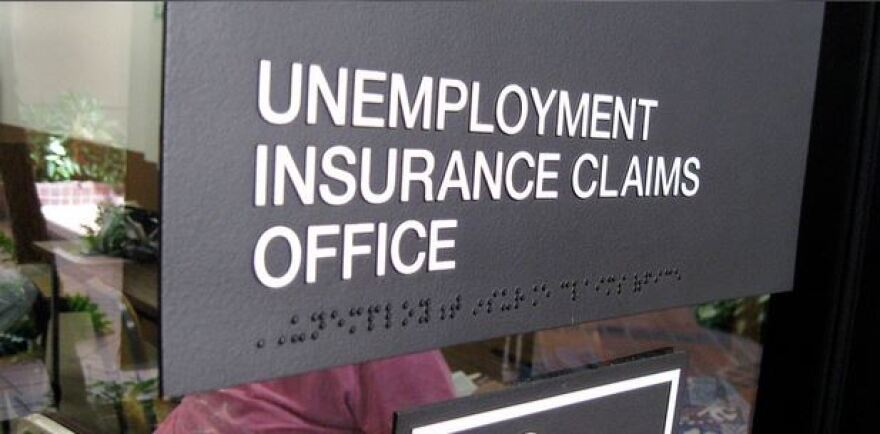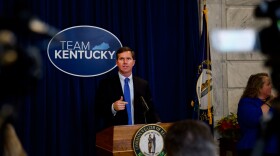For months, Kentucky officials have responded to concerns from people who owed overpayment debt from unemployment payments by saying they were seeking permission from the federal government to forgive the debts.
The most recent federal coronavirus relief package finally grants states that option, but it will have no effect in Kentucky. That’s because debt forgiveness still isn’t allowed under state law.
Kentucky made thousands of improper payments at the start of the pandemic, including many to people who believed they were eligible for unemployment benefits based on the governor’s directions, if they needed to “self-quarantine.” Some substitute teachers also racked up overpayment debt when they continued to claim while school was out for the summer.
The Continued Assistance Act signed by President Donald Trump on December 28 allowed states to waive debts if the overpayments were caused by a state error and if repayment would be “contrary to equity and good conscience.”
But since Kentucky doesn’t have a statute allowing the state to forgive overpayment debt, the unemployment office cannot actually forgive any of those debts, said Amy Cubbage, general counsel with the Kentucky unemployment office. She addressed the issue during the coronavirus briefing on Friday.
The Beshear administration has asked Kentucky lawmakers to give the state that option through legislation. She addressed the issue during the coronavirus briefing on Friday.
“We are hoping the General Assembly will give us the flexibility to waive those payments while they are here,” Cubbage said. “I know they have announced their willingness to do that so we look forward to working with you to achieve that so we can begin to waive those overpayments.”
State Rep. Nima Kulkarni, D-Louisville, plans to introduce legislation to allow Kentucky to forgive some overpayment debts.
Kentucky is one of only 10 states without a statute that would allow the unemployment offices to forgive unemployment insurance debts. “There’s just no reason for it,” Kulkarni said. Republican leadership in the legislature has also signaled they would support debt forgiveness.
The Continued Assistance Act that became law on December 28 also includes 11-week extensions of federal unemployment programs. Kentucky, like many other states, is waiting on further guidance from the Department of Labor before it can begin processing claims. The unemployment office said it does not have a target date when those payments will begin.
Kentucky previously violated federal rules when it rushed to make the first round of payments as the coronavirus hit. Beshear has said the federal guidance has shifted, resulting in errors and overpayments.
More Changes in the Budget
Beshear has proposed many changes to the unemployment insurance system in recent days, including a slate of investments included in his proposed budget.
Beshear said in his State of the Commonwealth address on Thursday that his budget “corrects a legacy of underfunding our unemployment insurance system.”
Kentucky’s unemployment insurance program had lost $16 million and 95 employees in budget cuts since the last recession, Beshear said. The coronavirus pandemic triggered a 1,300% year-over-year increase in unemployment insurance claims that Beshear said made painfully clear just how gutted previous administrations and legislative sessions had left the program.
Beshear’s budget proposal includes funding to reverse those cuts and make further investments in the unemployment insurance system — but Kentucky’s Republican legislature needs to sign off. Meanwhile, Kentucky is still waiting to implement key unemployment insurance changes included in the most recent federal coronavirus relief package pending further guidance from the Department of Labor.
Along with the staffing and budget reduction, Beshear said his administration “inherited a UI operation that runs on a IT system that is functionally obsolete.”
The governor’s budget proposes spending $47.5 million to upgrade the technology that has cramped the unemployment office’s efforts to get benefits out the door. The need for such an upgrade has been visible for years, but the unemployment office was only able to take the first steps towards a systems upgrade just this past March, as the coronavirus began closing businesses.
The budget also proposes $1.1 million in 2021 and $8.4 million in 2022 to restore 90 employees to the unemployment office that will help process claims.
The package also includes $48 million in CARES Act money to provide direct relief for people who have been waiting for payment or who previously received less than $176 in unemployment benefits.
Beshear said this aid is “the right thing to do,” since many Kentuckians have been waiting months without unemployment benefits. “This is the help they are owed and it's what they’re deserved. Far too many have waited far too long.”
Cubbage said on Friday that there are about 30,000 outstanding claims where people are still waiting on payment.
Beshear also put forward a plan to lessen the tax burden on Kentucky businesses that pay into the unemployment insurance trust fund. The budget plans to put $152 million of federal CARES Act spending towards the $859 million line of credit Kentucky opened with the federal government over the summer to continue paying unemployment insurance claims. The budget proposal asks the legislature to match that with $100 million in state funds.
Beshear’s budget is just a proposal, and ultimately the legislature needs to decide what kind of money to put into the unemployment system. Sen. David Givens, a R-Greensburg, previously told KyCIR he was reluctant to make large changes to the system until its financial stability was established.
Givens’ office did not respond to questions about the unemployment insurance provisions in the governor's budget.
Jason Bailey, the executive director of the Kentucky Center for Economic Policy, said addressing the weaknesses of the unemployment system should be a priority for everyone in Kentucky.
“The legislators have been bombarded just like the governor's office has, with people who need help, people who haven't gotten benefits or don’t have enough benefits,” Bailey said.
Bailey said the coronavirus has “made clearer than ever that the neglect of the system has contributed in a major way to the problems. And because of the federal aid, the one time federal aid money we have, we have a chance to fix it.”





